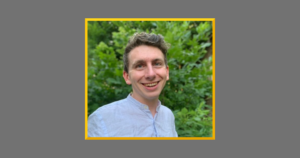After Henry Wehrs graduates, he’d like to join the Peace Corps. Or work in a nonprofit focusing on financial literacy. Or join an organization that supports affordable housing access.
He’s been there. He gets it.
“That (used to be) one of my big fears, that we weren’t going to have enough money to pay the rent and that we would lose our place,” he recalled. “I think my lack of financial literacy and my young adulthood has made me passionate about helping young people save for retirement and helping people who are in debt.”
That’s why Wehrs is studying economics and urban studies – he wants to have the tools to help people in the same circumstances he once faced.
A hard road to walk
Henry Wehrs grew up the second of five kids in a family that lived in La Crosse, Wisconsin. For college, he said, he wanted a big school, and UW-Milwaukee fit the bill. For a semester, he lived in the dorms, went to class, and enjoyed party life – until a mental health crisis hit and knocked Wehrs’ life off track.
“I have a history of mental health issues in my family and it’s a real struggle. I ended up having to leave school to recover. It was a pretty significant barrier to picking myself up after college,” Wehrs recalled. “I left UW-Milwaukee feeling very defeated and about $7,000 in school debt.”
That was in early 2013. Wehrs took several months to recover his health, and then he began to tackle the debt.
He spent the next three years working as a carpenter for a company in Madison. In 2016, he and his partner followed new opportunities to Whidbey Island, Washington, where Wehrs picked up another skill: “I was getting into home baking and baking my own bread,” he said. “I took a job at a company called Primal Island. I ended up baking there for a little under a year.”
But Wehrs didn’t want to be a baker or carpenter forever. He began thinking about college again, so he and his partner moved back to Milwaukee to be closer to UWM. But money was tight after two cross-country moves in less than two years.
“I picked up the first job I could find, which was in Riverwest at Tramont Manufacturing,” Wehrs said. “It was strange and interesting for me to be one of a very few white employees in a very working-class job dominated by African America and Hispanic workers. There were very clear racial divisions in the labor hierarchy. It got me really interested in labor relations and labor economics.”
But Wehrs knew he couldn’t stay. After just four months on the job, he was offered a raise – to a wage higher than one of his Hispanic coworkers, who had been with the company for 12 years.
Instead, Wehrs took a job at Troubadour Bakery. He biked to work every day from his apartment on the east side down to the bakery in Bay View, a commute that he said worked off all the croissants he ate on the job.
Feeling the pinch
Wehrs considers himself lucky that he had a steady income as he fought his way back to UWM, but living paycheck to paycheck brought a special kind of anxiety.
“Living in poverty, debt, or both, is a curse. You’re tense all the time,” he once wrote in a scholarship application. “A day without a gut-wrenching realization is a good one. … There was a feeling of desperation always lurking in the corner of my mind, ready to enter the foreground if my car broke down on the way home, or if I accidentally over drafted my checking.”
On top of his finances, Wehrs had to build up the courage to go back to school. His first semester had left quite a mark.
“I had a lot to prove to myself: That I can be a diligent student, that I was smart enough to go to college,” he said.
In 2019, Wehrs came back to UWM, and he’s thrived. It has been odd being much older than his classmates, he said, but he’s enjoyed his classes with history professor Amanda Seligman and economics professor John Heywood, and loves heading up the Economics Club with guidance from economics professor Rebecca Neumann. He’s even picked up a new language: Wehrs is taking Arabic and hopes to study abroad in Jordan next summer.
A word of advice
Because he’s been there, Wehrs feels for students who are facing their own hardships – be they financial or with mental health. His advice is to ask for help. It seems simple, but Wehrs knows it’s a challenge.
“I think that’s such an important skill that students need to learn. Don’t let your pride get in the way of seeking help. You deserve help. Take advantage of every resource available to you,” he said.
Wehrs plans to graduate in 2022.
By Sarah Vickery, College of Letters & Science
